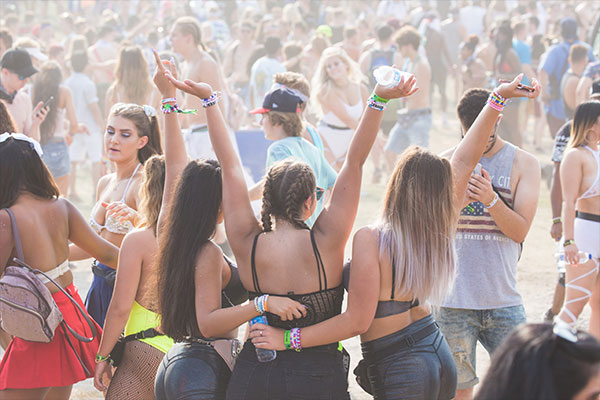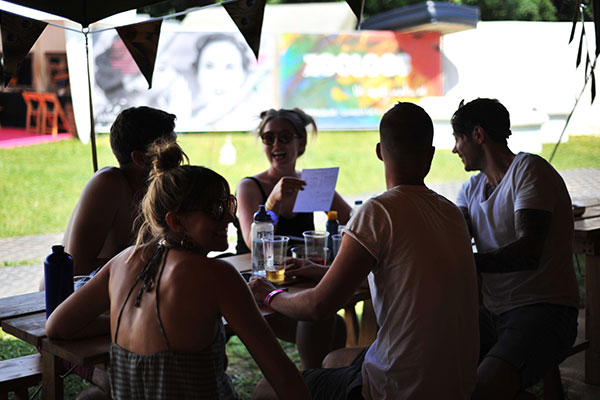How to start your own festival
January 2020
Happy New Year! Here at ZooBells we’re getting very excited for 2020 and the opportunities it might bring.
Charles Warner, our owner and all-important MD, may have started the Zoo vision back in 2000 with some loos and showers, but he’s always had the dream of creating amazing outdoor events.
Since 2013 we’ve grown our portfolio considerably, adding four brands – ZooLoos, ZooBells, ZooTipi and The Powder Room. But we’ve yet to create our own outdoor event… until now. Perhaps. We’re still not quite sure but we’ve started our research and thought we’d share what we’ve learnt so far.
It all begins with a dream
So many of us dream of being entrepreneurs. We look at start-ups around us and think ‘I could do that. And not only could I do it but I’d do it better’! The Zoo group has been in the events industry for nearly ten years now and we’ve met a lot of people who have seen an opportunity and taken it. The glamping and boutique camping scene (hats off to whoever even invented the word glamping) has gone from strength to strength and start-ups not only include the ubiquitous bell tent company but such inventions as hot tubs in vintage Land Rovers, vintage gypsy caravans and espresso machines in the boot of smart cars.
Starting your own festival is surely the next step. In 2019 we provided the glamping for Neverworld, a Kent festival that many will remember as LeeFest. LeeFest began in 2006 in the back garden of 16 year old Lee, when his parents went on holiday and left him in charge. Now it’s an annual fixture on the festival scene, attracting 5,000 festival goers (and it’s moved from Lee’s back garden!).
The Location
Whether your festival is focused on music or art or wellness, it’s important to choose a location carefully. You’ll not only need to be able to attract festival goers to that spot but you’ll need a site that works with logistics in mind. Boring but essential things like good access for vehicles and/or large lorries to bring in the kit, on-site power and water, level ground for stages and camping, good drainage…
Many new festivals have approached farmers or event venues who are looking to diversify. The End of the Road festival found their site by googling ‘festival site for hire’ and found their perfect spot in Larmer Tree gardens, old Victorian pleasure gardens near Salisbury. When the site isn’t hosting the End of the Road festival, they offer space for private parties, weddings and corporate events.
Management Team and People
The team around you can make or break your event. It’s important to all have the same vision, the drive to succeed and to be able to bring different talents to the table. Strawberries and Creem, a Cambridge festival who this year booked Stefflon Don and Ms Dynamite, was started by a group of five university friends with an average age of 23.
Dividing up responsibilities into Production Manager (booking and organising all the site contractors), Booking Manager (organising the line-up and artists) and Creative Manager (décor, theme of the festival, additional attractions) is important. And of course, vitally important is a Finance Manager, who manages the budget, and seeks sponsorship or brand involvement.
Marketing and Promotion
Attracting people to your festival or event is vital. A lot of the time you’ll be spending money before you make it, so knowing that you’ll attract a certain amount of people and forecasting their onsite expenditure is going to be key to your business plan.
Make the event special. You could incorporate a theme, spectacular décor or make festival goers part of the event. Think of the spectacular backdrops at Boomtown and the ongoing storyline at Lost Village. The entire festival can become a stage set.
Link these concepts creatively into your social media channels to start building a buzz and encourage awareness and bookings.
Decide the focus of your festival
We all know the standard outline of a festival. It’s Friday to Sunday, with a headliner each night finishing around 11pm, then perhaps the dance tent is open until 3am. There’s a silent disco in the campsite area, there’s a signing tent for artists, there’s a food court and overpriced beer. Right?
Not anymore! Todays festivals might be based around wellbeing, fitness, spoken word or comedy.
Event management platform Eventbrite discovered that that boutique and ‘micro-festivals’ have experienced 400% growth in the last four years. Over 18,000 festivals have been advertised on the platform over the past three years, from gin festivals to cheese fairs, showing that live music doesn’t have to be the prevailing offering. Many fitness or wellbeing festivals have also entered the sector, with festivals such as LoveFit offering fitness classes and workshops during the day and raves by night.
Plan the musical line-up carefully
If your festival is musically based, think carefully about how to plan the line-up to attract your festival goers. While many festival guests say they attend more for the experience than to see a particular band, there’s no denying that a stellar line-up will sell tickets, particularly strong headliners.
Watchet festival in Somerset started as the town carnival and slowly turned into a music festival as Mark Bale, now the festival organiser along with his wife Jackie, took over the main stage bookings. Soon the seafront venue became less viable and the festival moved to a new location on a farm outside of town. Now it attracts some 5000 music lovers annually, bringing life to the local community.
Be prepared to put in a lot of hard work
Unless your festival is going to be a one-off event, then you really do need to be prepared for continuous hard work as the cycle never ends. You’ll have barely finished this year’s live event when you’re already thinking about next year and starting to plan line-ups and book new artists.
Si of Chagstock in Devon, which started life as a weekend private party in a similar fashion to Leefest, said that he never intended his festival to become an annual event. He enjoyed doing the annual party for friends and family and decided to take it public after four years. That was back in 2007 and it’s grown every year.
Phew! Organising your own festival certainly seems like a lot of hard work. We reckon it’d be worth it though. We just need to start thinking about a location, the line-up, the focus, the décor…

Sleep in style
The ultimate boutique camping experience








